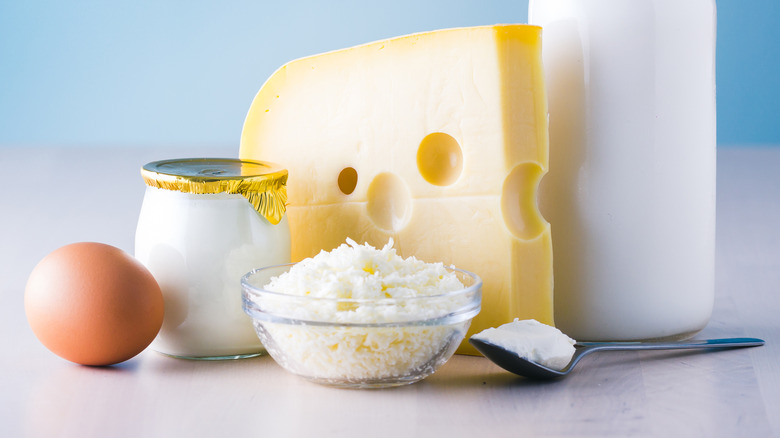Are Eggs Actually Considered Dairy?
Have you ever wondered about eggs and whether they're officially considered a dairy product? Many people are understandably mistaken in thinking eggs are dairy — probably because stores often advertise and sell eggs and dairy products in the same area, as Medical News Today points out. Another common but misleading factor that might crop up in this line of logic is that both eggs and dairy products are excluded from a vegan diet, meaning that they, yet again, get grouped together with dairy within a single category.
As Britannica explains, however, the definition of "dairy products" is pretty strict: It has to be a food product made from milk. According to Britannica, human milk consumption has been around since humans have. Although it's true that cows are the most popular dairy animal in the world, there are also many milk products derived from other mammals, including sheep, goats, buffalo (you know, buffalo mozzarella!), and even reindeer.
But back to the original point: If eggs aren't considered a dairy product then which food group is eggs considered a part of? And does that definition ever change? Sometimes it does — and that all depends on your specific cultural outlook.
How can eggs be categorized?
Judaism's dietary restrictions and guidelines — also known as keeping kosher — state that there are only three food groups: fleishig (meat), milchig (dairy), and pareve (not-meat-or-dairy), according to Healthline. Pareve is generally considered the largest, most encompassing food group — it includes everything from eggs to fruits and vegetables, grains, and fish. However, eggs that are considered kosher must come from animals that are also considered okay to eat within the parameters of keeping kosher; in addition to this, they are automatically rendered unkosher if they contain a minimum of one blood spot (via Judaism 101). Islam is another religion that has dietary guidelines and traditions, known as halal. As one post on the website Islam Q&A explains, only eggs from halal animals are considered halal.
Many Hindus are Lacto-vegetarians — which, as Healthline notes, is a term used to define a vegetarian diet that does not include the consumption of eggs — though this can vary based on location. So when it comes to eggs, do Lacto-vegetarian followers of Hinduism consider eggs to be a type of meat product? It's difficult to pin down an objective answer online, though the discussion surrounding the consumption of eggs for Hindus can at times be controversial, per NPR, and points towards placing eggs in a "meat" category, rather than a dairy-based one.
So, the categorization of eggs can differ based on one's diet preference, culture, religion, and geographical location. Just like there are 101 ways to cook an egg, there seem to be just as many ways to classify it.

